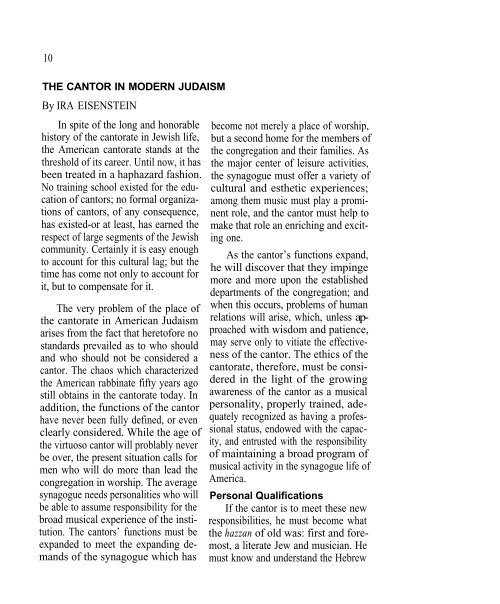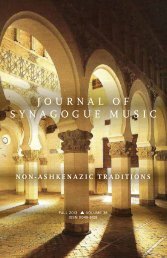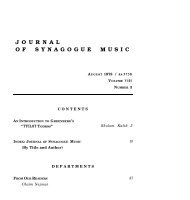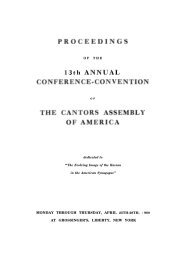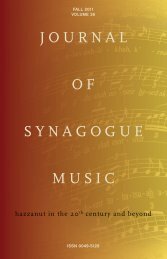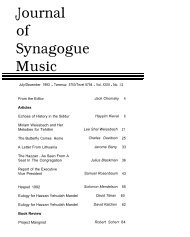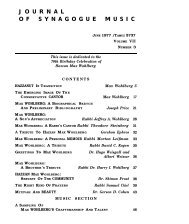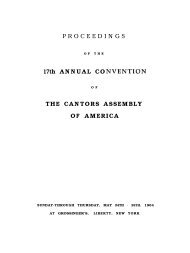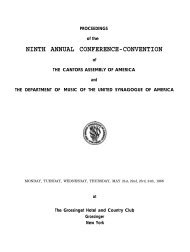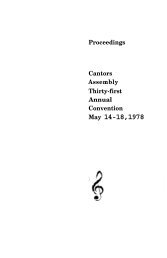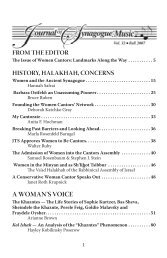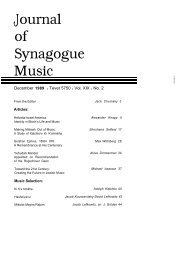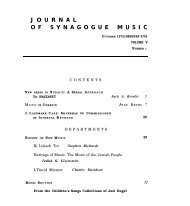Volume 16, Number 2 - Cantors Assembly
Volume 16, Number 2 - Cantors Assembly
Volume 16, Number 2 - Cantors Assembly
You also want an ePaper? Increase the reach of your titles
YUMPU automatically turns print PDFs into web optimized ePapers that Google loves.
10<br />
THE CANTOR IN MODERN JUDAISM<br />
By IRA EISENSTEIN<br />
In spite of the long and honorable<br />
history of the cantorate in Jewish life,<br />
the American cantorate stands at the<br />
threshold of its career. Until now, it has<br />
been treated in a haphazard fashion.<br />
No training school existed for the education<br />
of cantors; no formal organizations<br />
of cantors, of any consequence,<br />
has existed-or at least, has earned the<br />
respect of large segments of the Jewish<br />
community. Certainly it is easy enough<br />
to account for this cultural lag; but the<br />
time has come not only to account for<br />
it, but to compensate for it.<br />
The very problem of the place of<br />
the cantorate in American Judaism<br />
arises from the fact that heretofore no<br />
standards prevailed as to who should<br />
and who should not be considered a<br />
cantor. The chaos which characterized<br />
the American rabbinate fifty years ago<br />
still obtains in the cantorate today. In<br />
addition, the functions of the cantor<br />
have never been fully defined, or even<br />
clearly considered. While the age of<br />
the virtuoso cantor will problably never<br />
be over, the present situation calls for<br />
men who will do more than lead the<br />
congregation in worship. The average<br />
synagogue needs personalities who will<br />
be able to assume responsibility for the<br />
broad musical experience of the institution.<br />
The cantors’ functions must be<br />
expanded to meet the expanding demands<br />
of the synagogue which has<br />
become not merely a place of worship,<br />
but a second home for the members of<br />
the congregation and their families. As<br />
the major center of leisure activities,<br />
the synagogue must offer a variety of<br />
cultural and esthetic experiences;<br />
among them music must play a prominent<br />
role, and the cantor must help to<br />
make that role an enriching and exciting<br />
one.<br />
As the cantor’s functions expand,<br />
he will discover that they impinge<br />
more and more upon the established<br />
departments of the congregation; and<br />
when this occurs, problems of human<br />
relations will arise, which, unless approached<br />
with wisdom and patience,<br />
may serve only to vitiate the effectiveness<br />
of the cantor. The ethics of the<br />
cantorate, therefore, must be considered<br />
in the light of the growing<br />
awareness of the cantor as a musical<br />
personality, properly trained, adequately<br />
recognized as having a professional<br />
status, endowed with the capacity,<br />
and entrusted with the responsibility<br />
of maintaining a broad program of<br />
musical activity in the synagogue life of<br />
America.<br />
Personal Qualifications<br />
If the cantor is to meet these new<br />
responsibilities, he must become what<br />
the hazzan of old was: first and foremost,<br />
a literate Jew and musician. He<br />
must know and understand the Hebrew


